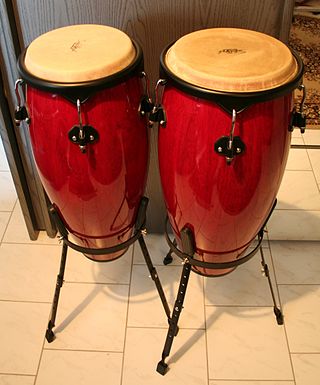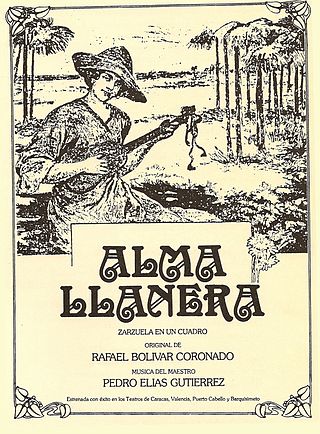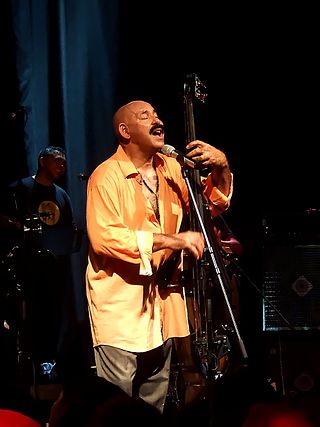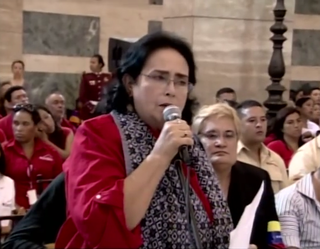
Salsa music is a style of Caribbean music, combining elements of Cuban, Puerto Rican, and American influences. Because most of the basic musical components predate the labeling of salsa, there have been many controversies regarding its origin. Most songs considered as salsa are primarily based on son montuno and son Cubano, with elements of cha-cha-chá, bolero, rumba, mambo, jazz, R&B, rock, bomba, and plena. All of these elements are adapted to fit the basic Son montuno template when performed within the context of salsa.

Úrsula Hilaria Celia de la Caridad Cruz Alfonso, known as Celia Cruz, was a Cuban singer and one of the most popular Latin artists of the 20th century. Cruz rose to fame in Cuba during the 1950s as a singer of guarachas, earning the nickname "La Guarachera de Cuba". In the following decades, she became known internationally as the "Queen of Salsa" due to her contributions to Latin music. She had sold over 10 million copies, making her one of the best-selling Latin music artists.

Several styles of the traditional music of Venezuela, such as salsa and merengue, are common to its Caribbean neighbors. Perhaps the most typical Venezuelan music is joropo, a rural form which originated in the llanos, or plains.

Los Van Van is one of the leading musical groups of post-revolutionary Cuba. It was founded in 1969 by bassist Juan Formell, who directed the band until his death in 2014. Formell and former band members Changuito and Pupy are some of the most important figures in contemporary Cuban music, having contributed to the development of songo and timba, two popular dance music genres.
Son cubano is a genre of music and dance that originated in the highlands of eastern Cuba during the late 19th century. It is a syncretic genre that blends elements of Spanish and African origin. Among its fundamental Hispanic components are the vocal style, lyrical metre and the primacy of the tres, derived from the Spanish guitar. On the other hand, its characteristic clave rhythm, call and response structure and percussion section are all rooted in traditions of Bantu origin.
Gilberto Miguel Calderón, known professionally as Joe Cuba, was an American conga drummer of Puerto Rican descent widely regarded as the "Father of Latin Boogaloo".

Cheo Feliciano was a Puerto Rican singer and composer of salsa and bolero music. Feliciano was the owner of a recording company called "Coche Records". He was the first tropical singer to perform at the "Amira de la Rosa Theater" in Barranquilla, Colombia, and in 1987 he played the role of Roberto Clemente's father in the musical Clemente.
Pellín Rodríguez was a Salsa singer. Rodríguez was a member of the musical group El Gran Combo and toured with them all over Latin America and Europe, gaining fame and popularity as a singer. In addition to his singing capabilities, Rodríguez had great comedic abilities and participated on comedy bits on various TV shows in Puerto Rico.

Alberto Naranjo [nah-rahn'-ho] was a Venezuelan musician. His mother, the singer Graciela Naranjo, was a radio, film and television pioneer in her homeland. Largely self-taught, Naranjo embarked on a similar musical course, becoming – like his mother – one of Venezuela's icons of contemporary popular music.

Juan Pablo Knipping Pacheco, known as Johnny Pacheco, was a Dominican musician, arranger, composer, bandleader, and record producer. Born in the Dominican Republic, Pacheco became a leading figure in the New York salsa scene in the 1960s and 1970s as the founder and musical director of Fania Records.

Óscar Emilio León Simoza, known as Oscar D'León, and affectionately called The Pharaoh of Salsa, The Lion of Salsa, and the World's Sonero, is a Venezuelan musician and bassist best known for his salsa music. He is the author of "Llorarás", which he recorded in 1974 with his group, Dimensión Latina. He is also an ambassador for Operation Smile.
The Dimensión Latina is one of the most famous and representative salsa music and Latin bands from Venezuela, and one of the notable names in the early history of salsa in the American continent. It was founded on March 15, 1972, in Caracas, Venezuela, by six young musicians: Jose "Joseíto" Rodríguez, the pianist Enrique "Culebra" Iriarte, the trombonists César "Albóndiga" Monges and José Antonio "Rojitas" Rojas, the congas player Elio Pacheco and a vocalist that would soon become one of the most popular and influential singers and musicians in the history of Latin music in the American continent: the singer and bass player Oscar D'León.

The Sexteto Habanero was a Cuban son sextet founded in 1920 in Havana. It played an important part in the early history of the genre, contributing to its popularization all around Cuba. In 1927, the band incorporated a cornet player becoming the Septeto Habanero. Although most original members left in the 1930s, the band has continued to perform and record with different line-ups. Their last album was released in 2010 for their 90th anniversary.
Jimmy Sabater was an American musician of Puerto Rican ancestry. A three-time winner of the ACE Awards, he was a singer and timbales player. He gained international fame thanks to his work with the Joe Cuba Sextet in the 1960s and '70s, and later became the lead singer of various groups including Charlie Palmieri's Combo Gigante. His son, Jimmy Sabater Jr., is a trumpeter and bandleader.
Canelita Medina was a Venezuelan salsa singer noted for singing in the Cuban Son style. She had always dreamt of becoming a singer as a young girl, imitating the salsa singer Celia Cruz. When she entered a radio talent program on Radio Continente, she caught the attention of talent agents with her unique voice. Over the years, Canelita has achieved great success, both nationally and internationally, and is successful to this day. Through more than 50 years of her life as an artist, Canelita Medina has received many awards.

Lilia Vera is a Venezuelan folk singer, whose contemporary folk music range is inspired by traditional Venezuelan genres and songs of protest or social justice.

Barbarito Díez was a Cuban singer who specialized in danzón. He began his career as the singer for Graciano Gómez and Isaac Oviedo's son group, before joining Antonio María Romeu's orchestra. As the lead vocalist for Romeu's ensemble for 20 years, he established himself as one of the main exponents of the sung danzón. He continued singing with his own charanga, as well as other groups, for another 30 years. He also toured and recorded in Venezuela and Puerto Rico before retiring in the early 1990s, when complications from diabetes prevented him from performing and eventually resulted in his death in 1995. A naturally-gifted tenor, he was known for his sense of rhythm, correct diction and romantic style.
Francisco Fellove Valdés, also known as El Gran Fellove, was a Cuban songwriter and singer. A prolific composer of the feeling generation, he is well known for his particular style of scat singing known as chua chua. He is the author of the famous guaracha-pregón "Mango mangüé", recorded by Machito and Celia Cruz among others. He was the cousin of conga drummer Carlos "Patato" Valdés.
Los Cuñaos[coo-nyah'-os] is an eight-part vocal group established in Caracas, Venezuela in 1974. Their repertoire is based on popular Venezuelan songs adapted to their own unique style of singing, performing a crossover of traditional and pop genres while contrasting their work with rich and warm harmonies.